
5 Assembly Halls of Chinese Communities in Hoi An
- on Sep 19, 2019 By: BN
Along the streets of Tran Phu and Nguyen Duy Hieu in the heart of Hoi An ancient town, you can enjoy the beautiful architecture of “Hoi quan”, the assembly hall.
The Chinese had been in Hoi An for a long time before a considerable flow of immigrants came in the 17th century. All the Chinese communities like Guangzhou, Fujian, and Hainan had settled into the area and started doing business with the upstream inhabitants of the Thu Bon River and with merchants from other countries. Over the centuries, the heritage of northern culture still occupied an important place in local life.
Their presence is well visible in the houses, temples, pagodas and especially the assembly halls which are all the remarkable religious buildings. A meeting place of Chinese communities but also a sacred temple, the “hoi quan” or assembly hall is one of the special places contributing to the outstanding cultural and architectural remains of Hoi An. You simply can’t miss visiting these cultural halls when visiting Hoi An. Here are five of the most popular places in the most charming city in Central Vietnam.
1. Hoi quan Phuc Kien or Fujian Assembly Hall (46 Tran Phu street)
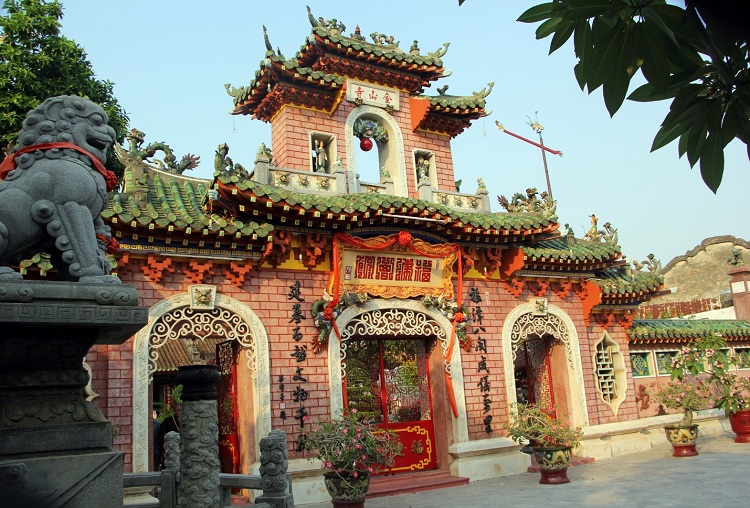
Fujian Assembly Hall, the biggest and most beautiful of the 5 halls, is undoubtedly the most visited. Visitors can admire the architecture typical of Fujian, inspired by the oriental philosophy of ‘happiness’. Built in 1697, it was originally a temple dedicated to the statue of Thien Hau or the Goddess of the Sea, who was the protector of fishermen and marine traders.
As a sacred place, Hoi quan Phuc Kien has attracted many pilgrims and visitors who come and pray for health and prosperity.
>>Read more: Phuc Kien temple or the Fujian Assembly Hall in Hoi An
2. Hoi quan Quang Dong or Cantonese Assembly Hall (176 Tran Phu street)
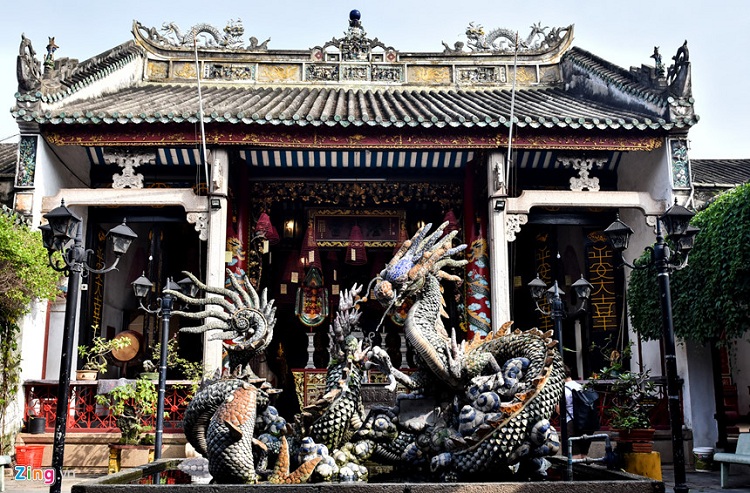
Also known as Quang Trieu assembly hall, this building is very representative of Cantonese culture. It is distinguished by its beautiful wood carvings and finely decorated columns, formed of a single block of granite. We do not know exactly the date of its construction, but it probably dated back to the year 1885. Dedicated initially to the worship of the Goddess and Confucius, after 1911 it became a place to worship Quan Cong and deceased ancestors.
Its biggest annual festival, the Tet Nguyen tieu, is organized on the day of the full moon of the 1st lunar month and attracts thousands of people. This is an opportunity to celebrate the new year by wishing luck, progress, and prosperity and is also the time of reunion for the Chinese.
3. Hoi quan Ngu Bang or Trung Hoa Assembly Hall (64 Tran Phu street)
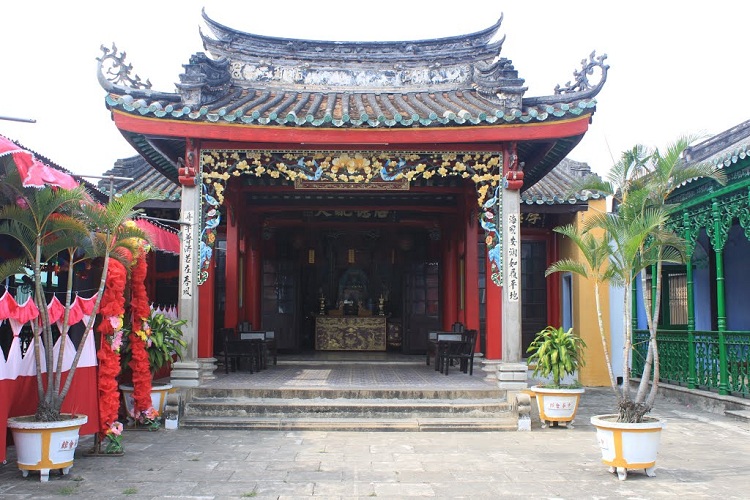
Also called Duong Thuong or Hoi quan Ngu Bang; Trung Hoa Assembly Hall was constructed in 1741 and is the oldest. As the name suggests, it had the support of merchants in Fujian, Chaozhou, Guangzhou, Hainan and Hakka. Here, they worshipped their Goddess Thien Hau and also Thien Ly Nhan, Thuan Phong Nhi, the Chinese geniuses.
The place had stood out from other assembly halls in Vietnam because it hosted the meetings of all the Chinese, without distinction of their native region. Despite three centuries having gone by, its original architecture is preserved in a fascinating combination of the typical Chinese and traditional elements of Hoi An. Visitors can also find the models of Chinese vintage boats here.
4. Hoi quan Hai Nam or Hainan Assembly Hall (10 Tran Phu street)
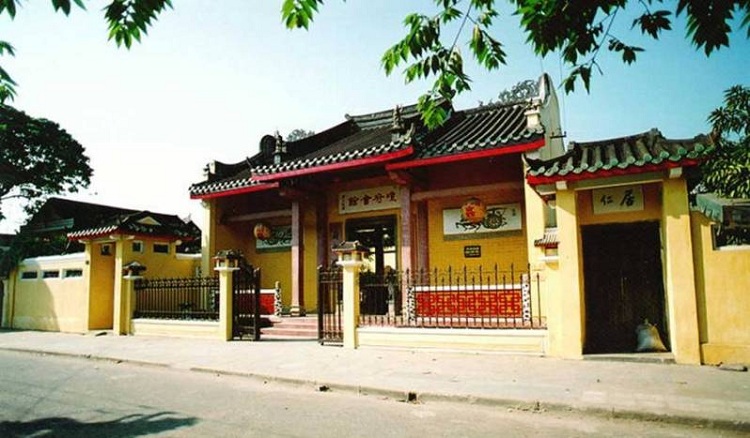
A religious space of Chinese people from Hainan and Hakka, it was previously known as Quynh Phu assembly hall. Founded in 1875, it was used to commemorate the 108 Chinese merchants who were executed under the reign of the Nguyen dynasty for being mistaken as pirates.
Located in a large space between Tran Phu Street and Phan Chu Trinh Street, this greatly decorated temple has tall marble columns and a remarkable wooden altar. You can admire the impressive bas-relief that shows the scenes of life in three worlds, Heaven, Earth and Water.
5. Hoi quan Trieu Chau or Chaozhou Assembly hall (157 Nguyen Duy Hieu street)
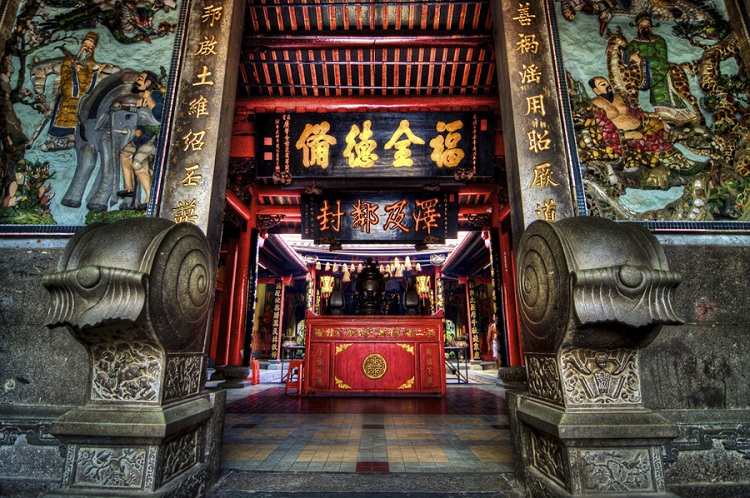
Built in 1845 by the Chinese people from Chaozhou, it was the sacred place for honoring the geniuses of the sea, who, according to popular belief, brought luck to sea traders. Beautiful wooden sculptures, finely worked earthenware and ceramic reliefs on the beams and the altar make it an exceptional architectural monument of Hoi An.
The Nguyen Tieu festival is held there every year on the 16th of the First Lunar Month, in tribute to the ancestors and always attracts a large number of participants.
>> ​​​​​​​ Read more: Chaozhou Hall: A place to visit in Hoi An
Related articles:
>> The Japanese covered bridge: a timeless symbol of the Hoi An old town
>> Phung Hung ancient house: a must visit destination in Hoi An
>> Hoi An night markets: a must-see in the old city
>> My Son Sanctuary: A treasure of the Champa kingdom around Hoi An
Comment
Other Blog
Categories
Latest News
on 27 Apr, 2023      
on 15 Apr, 2023      
on 28 Mar, 2023      
 Español
Español Français
Français



















F
on Jan 3, 2024Igor Mozetic
on Apr 8, 2023Ira Beale
on Feb 10, 2023Phạm Phú Toàn
on Jan 28, 2023Max Stover
on Jan 11, 2023